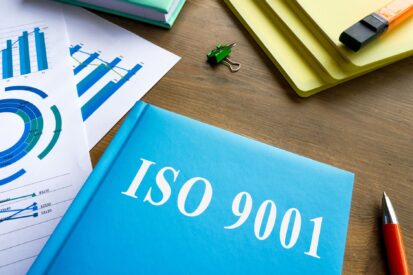As Australian businesses strive for excellence in today’s competitive market, adopting internationally recognised management standards like ISO 27001 for information security and ISO 9001 for quality management can provide significant advantages. While implementing these standards separately offers substantial benefits, integrating them into a unified management system can result in even greater organisational resilience and efficiency. This detailed guide will help your business harmonise ISO 27001’s information security management with ISO 9001’s quality management principles, creating a holistic management system focused on sustained success.
By exploring the commonalities between the two standards, we’ll demonstrate how their integration can lead to improved risk management, streamlined processes, and simplified compliance management for your organisation. Additionally, we’ll highlight essential steps and best practices for seamless integration, ensuring you’re well-equipped to leverage the combined power of ISO 27001 and ISO 9001 for your Australian business. Embrace a comprehensive approach to information security and quality management, helping you to differentiate in an increasingly connected world and boost customer confidence in your brand.
Debunking Common Myths about ISO 9001
Myth 1: ISO 9001 Is Only for Manufacturing Companies
A common misconception about ISO 9001 is that it only applies to manufacturing companies. While ISO 9001 originated in the manufacturing sector, it has evolved over the years to become a universal standard for managing quality across various types of businesses and industries. In fact, ISO 9001:2015 is applicable to any organisation, regardless of its size, industry, or the products and services it offers.
The primary goal of ISO 9001 is to help organisations establish, implement, and maintain an effective quality management system (QMS), fostering a culture of continuous improvement. By doing so, they can enhance customer satisfaction, streamline processes, reduce waste, and improve overall operational efficiency – all valuable objectives for any type of business.
Myth 2: ISO 9001 Is Just a Piece of Paper
Some may believe that obtaining ISO 9001 certification is nothing more than getting an official “piece of paper” and has little impact on a company’s practical performance. However, the certification process involves a thorough audit by an independent third-party organisation, which verifies that your QMS meets the requirements of the ISO 9001 standard. This process ensures that your business has implemented effective quality management practices, signalling your commitment to quality and continuous improvement to clients, partners, and stakeholders.
By undergoing the rigorous ISO 9001 certification process, your organisation demonstrates dedication to quality management and fosters a culture of excellence, resulting in tangible benefits such as increased customer satisfaction, reduced defects and complaints, and improved operational performance.
Myth 3: Implementing ISO 9001 Takes Too Much Time and Resources
It is a common belief that implementing ISO 9001 is a lengthy, complicated, and resource-intensive process. The reality is that the implementation process varies depending on the size and complexity of your organisation and the efficiency of the existing QMS. Many companies can establish a solid foundation for their QMS and pursue certification within a few months, while others may need more time to align with the standard’s requirements.
By assigning a dedicated project team, setting realistic targets, and following a well-structured implementation plan, most organisations can achieve ISO 9001 certification more quickly and smoothly than they may initially anticipate. The commitment to continuous improvement inherent in ISO 9001 can also yield long-term cost savings and efficiency gains, serving as an excellent return on investment for the time and resources spent on implementation.
Myth 4: ISO 9001 Forces You to Implement Rigid Procedures
Some critics argue that ISO 9001 mandates a strict and rigid set of procedures that may stifle innovation, flexibility, and adaptation within an organisation. The truth is that ISO 9001 promotes the adoption of a process-based approach to quality management, not rigid procedures. The standard focuses on creating a robust QMS that continuously tracks and improves processes, allowing for adjustments and changes based on the specific needs of the organisation and its customers.
The ISO 9001:2015 standard, in particular, has been designed with flexibility in mind, accommodating the varying needs of businesses across different industries. Rather than dictating exact procedures, the standard provides a framework for effective quality management that can be tailored to suit your organisation’s unique operational context and objectives. By aligning with ISO 9001 requirements, your company can develop a QMS that balances standardisation with the agility needed to respond to the ever-changing business landscape.
Myth 5: Getting ISO 9001 Certification Means Never Having to Change Again
The notion that obtaining ISO 9001 certification means you never have to change your business again is, quite simply, a myth. The ISO 9001 standard, by its very nature, emphasises the importance of continuous improvement and an ongoing commitment to quality. Achieving certification should be viewed as a significant milestone on your organisation’s journey towards excellence, not a final destination.
The third-party audits required for maintaining your ISO 9001 certification ensure that your QMS remains in line with the standard’s requirements, adapts to changes in your business environment, and continues to drive improvements throughout the organisation. By committing to the principles of ISO 9001 and regularly reviewing and refining your QMS, your business can stay ahead of the competition and consistently meet the demands of customers and stakeholders alike.
In conclusion, debunking these common misconceptions about ISO 9001 can provide organisations with a clearer understanding of the true purpose of the standard and the benefits it provides. Approaching ISO 9001 implementation with accurate information and an open mindset can empower businesses to maximise the value of their quality management initiatives and secure a competitive advantage in today’s fast-paced, quality-driven market. The ISO 9001 standard offers a flexible framework that, when implemented effectively, can bring about significant improvements in efficiency, customer satisfaction, and overall business performance.
Embracing the True Value of ISO 9001
By debunking common misconceptions surrounding ISO 9001, organisations can better understand the true value and benefits this globally recognised standard provides. Businesses across various industries can leverage the ISO 9001 framework to create an effective quality management system that promotes continuous improvement, enhances operational efficiency, and fosters customer satisfaction. Whether your company is looking to initiate the ISO 9001 certification process or refine an existing QMS, having accurate information is crucial to achieving success.
If you’re interested in learning more about ISO 9001 certification and implementation, contact us for expert guidance and support. Our experienced team of consultants can help you navigate the journey towards certification and unlock the full potential of a robust quality management system, empowering your business to thrive in today’s competitive market. Contact ISO 9001 Consultants today and take the first step towards embracing the true value of ISO 9001 for your organisation.








Users Comments
Get a
Quote